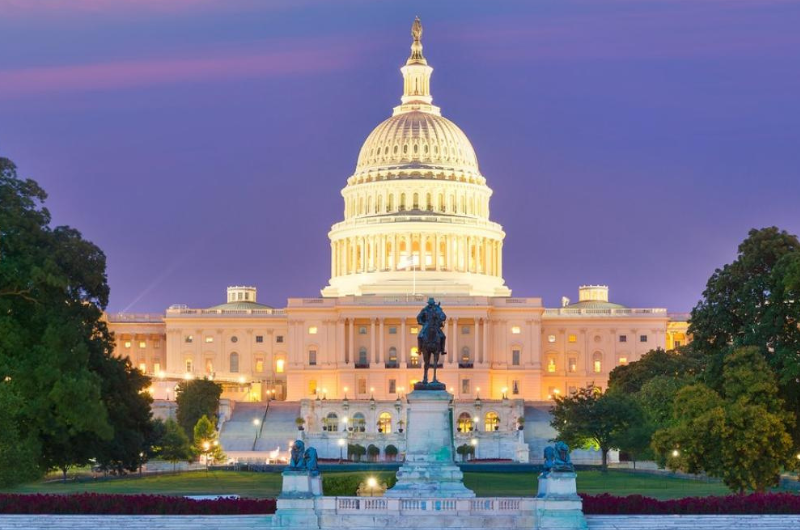Credit union leaders who will attend this year’s Governmental Affairs Conference (GAC) attended a virtual pre-event briefing hosted by the California and Nevada Credit Union Leagues’ advocacy team this week to prepare for discussions with legislators and regulators.
You can view the Leagues’ GAC Resource Site, which includes an agenda, appointments, legislative and regulatory talking points, congressional offices, and other information!
From meetings to activities — all mostly held at the Walter E. Washington Convention Center — this year’s credit union advocates will descend on Washington, D.C. from March 3 – 7 to provide one unified voice on several issues important to their organizations and their member-owners across both states.
This year’s sponsors include American Share Insurance (ASI), Excess Share Insurance (ESI), TruStage, FHLBank San Francisco, and PSCU/Co-op Solutions. The Leagues would like to thank all sponsors for stepping up this year to once again support the credit union movement in California and Nevada.
Where is Congress’s Collective Mind Right Now?
Members of Congress will have much on their minds during our visits at the Governmental Affairs Conference. The deadlines to pass government spending bills are March 1 and March 8. If Congress fails to pass budget bills by March 1, there may be a partial government shutdown when we knock on doors on Capitol Hill.
Tuesday, March 5, is “Super Tuesday.” California, along with 16 other states and territories, will be voting in federal primary elections. Super Tuesday stands out as a pivotal event in the presidential nominating process, demanding significant resources from candidates and political parties. This expansive election day spans from Maine to California, engaging diverse segments of the American population. How candidates perform on Super Tuesday will all but seal the deal on presidential nominations.
Thursday, March 7 (the day after Capitol Hill visits), President Joe Biden will be delivering the State of the Union address.
To put it lightly, members of Congress have a lot to consider: 1) potential government shutdown; 2) primary elections; and 3) the State of the Union address. For this reason, we must truly bring our “A game” and share our compelling narratives on the credit union movement.
U.S. House and Senate Congressional Delegations
The California and Nevada congressional delegations have 52 U.S. House of Representatives seats from California and four from Nevada, all of which have some role linked to our presence in the communities they represent.
Each state has two senators. California has its newest senator, Laphonza Butler, who is temporarily serving in the U.S. Senate until the election this November. She currently sits on the Senate Banking, Housing and Urban Development Committee.
In Nevada, Sen. Catherine Cortez Masto (D-NV) also serves on the Senate Banking Committee. In addition, she serves as a deputy for Senate Majority Leader Chuck Schumer (D-NY) and continues to support many of credit unions’ legislative efforts.
Sen. Jacky Rosen (D-NV) is up for re-election. When we recently met with Senator Rosen in August, she shared her strong commitment to cybersecurity issues. She also expressed interest in spearheading legislation to support credit unions.
Some credit union friends are leaving Congress. Reps. Grace Napolitano (D-CA) and Anna Eshoo (D-CA) will retire in 2024. Former House Speaker Kevin McCarthy (R-CA) retired earlier this year. Three members of Congress are vacating their seats in the House and campaigning for the open seat in the Senate. These members are Reps. Adam Schiff (D-CA), Barabara Lee (D-CA), and Katie Porter (D-CA). All members of Congress from Nevada are seeking to keep their seats in the House and Senate.
Credit Unions’ Top Congressional Legislative Priorities
Top congressional legislative priorities:
- R. 3881/S. 1838: Credit Card Competition Act
- Authors: Reps. Lance Gooden (R-TX) and Zoe Lofgren (D-CA); and Sens. Dick Durbin (D-IL) and Roger Marshall (R-KS).
- Background: Retailers pay credit card interchange fees for the convenience of instant payment and assuming no data security requirements. If there is a data breach, credit unions use a portion of interchange fees to defray the cost of replacing compromised cards and reimbursing consumers.
- Summary: The Credit Card Competition Act (CCCA) requires financial institutions with $10 billion or more in assets to offer at least two credit card networks for transactions to be routed on. The merchant would choose the network to process the transaction.
- Status: Introduced in the U.S. House and Senate. Sen. Roger Marshall claims the Senate will have a vote before the 2024 election. The Senate may have a markup in the Senate Judiciary Committee in February or March.
- Federal Reserve’s Regulation II: Proposed Debit Interchange Rule
- Background and summary: If finalized, this proposed debit interchange fee rule by the Federal Reserve would: Reduce debit interchange revenue fee caps per transaction; automatically update fee caps every two years based on a formula. Data from the formula is limited to information from large financial institutions ($10 billion and over); have future modifications to debit interchange fees based on a formula and without public comment.
- Status: The rule was proposed in 2023, and the deadline to submit a comment through the Federal Register is May 12.
- Consumer Financial Protection Bureau’s Proposed Overdraft Regulation
- Background and summary: The Consumer Financial Protection Bureau (CFPB) has proposed a regulation that requires financial institutions with $10 billion-plus in assets to break-even on each overdraft transaction OR implement a “safe harbor” fee ranging from $3 – $14.
- Status: The deadline to comment is Monday, April 1.
- Quick Cosponsor Opportunities
- By cosponsoring the following non-controversial bills, members of Congress can help propel credit unions into the future.
- R. 4867/S. 539 (Veterans Member Business Loan Act): This bill would empower credit unions to offer more loans to veteran-owned businesses. Currently, the amount of loans that can be offered is restricted because current law caps credit unions’ business lending to 12.25 percent of assets under current law.
- R. 6933 (Expanding Access to Lending Options Act): Current law limits the life of a business loan from credit unions to 15 years. This bill would extend the life of a business loan to 20 years.
- 610 (Credit Union Board Modernization Act): The bill would update the Federal Credit Union Act by modifying the requirement that credit union boards meet once a month to not less than six times per year.
- National Data Standard for Retailers
- Background: Depository institutions are held to a national standard of data privacy and security under the Gramm-Leach-Bliley Act (GLBA).
- Other awareness and issues include: wellbeing and inclusion, tax status, Federal Home Loan Bank (FHLB), cannabis banking, cryptocurrency and digital assets, fintechs, preventing banking deserts, Consumer Financial Protection Bureau (CFPB) leadership, policies tailored to fit credit unions’ unique model, and housing affordability.
Credit Unions’ Top NCUA Regulatory Priorities
Top NCUA regulatory priorities:
- Call Report Amendments for Overdraft and Non-Sufficient Funds (NSF) Fee Data Fields
- NCUA Chair Todd Harper mentioned at a recent Brookings Institution event that the National Credit Union Administration (NCUA) is considering mandating credit unions with assets exceeding $1 billion to report overdraft and non-sufficient funds (NSF) fees separately. While specifics were not provided, he noted that the NCUA is reviewing the Paperwork Reduction Act to amend the 5300 Call Report for data collection. This indicates a forthcoming rulemaking process with public comment opportunities, although formal rulemaking under the Administrative Procedures Act may not be required.
- In April 2023, the California Department of Financial Protection and Innovation (DFPI) issued its first annual report on income from non-sufficient funds (NSF) and overdraft charges, encompassing data from all state-chartered banks and credit unions.
- Third-Party Vendor Examination
- NCUA Chair Todd Harper continues to push for congressional amendments to the Federal Credit Union Act (FCU Act) to provide the agency with direct supervisory authority over third-party vendors. Citing ongoing concerns about the National Credit Union Share Insurance Fund (NCUSIF), we expect this will remain a priority of Harper’s throughout 2024.
- Consumer Compliance Examinations
- NCUA Chair Todd Harper has indicated that the agency may pursue a dedicated consumer compliance exam program for large credit unions not yet examined by the Consumer Financial Protection Bureau (CFPB).
- NCUA’s Balanced Relationship with the Consumer Financial Protection Bureau (CFPB)
- Credit unions are best positioned to succeed when policy decisions are made by a regulatory agency that has significant familiarity with the characteristics that differentiate them from other financial service providers.
Credit Unions’ Top CFPB Regulatory Priorities
Top CFPB regulatory priorities:
- Consumer Financial Products or Service Fees (Overdraft and Non-Sufficient Funds)
- In January 2024, the Consumer Financial Protection Bureau (CFPB) proposed two new rules: one restricting overdraft fees and the other prohibiting non-sufficient funds (NSF) fees on certain declined transactions. The proposals are the CFPB’s latest moves to further President Joe Biden Administration’s “junk fees” agenda.
- Rules on Open Banking
- In October 2023, the CFPB issued a proposal on personal financial data rights (also known as open banking). The proposal is intended to accelerate a shift toward open banking. It establishes a comprehensive regulatory framework, providing consumers and their authorized third parties with rights to receive structured, consistent, and timely access to consumers’ personal financial data held by financial institutions. The proposal aims to do this by imposing limitations on authorized third-party collection, use, and retention of that data.
Credit Unions’ Top Federal Reserve Board (FRB) Priorities
Top FRB regulatory priorities:
- Background and Context
- In October 2023, the Federal Reserve Board (FRB) issued a proposed rule to amend Regulation II that would drastically change the debit card interchange fee cap. Under the proposal, the base component would: decrease from 21 cents to 14.4 cents; the ad valorem component would decrease from 5.0 basis points (multiplied by the value of the transaction) to 4.0 basis points (multiplied by the value of the transaction); and the fraud-prevention adjustment would increase from 1.0 cent to 1.3 cents for debit card transactions subject to the interchange fee cap. Importantly, the proposal also includes a formula that would periodically adjust the interchange fee cap based on data voluntarily reported to the FRB by debit card issuers. If adopted, this formulaic approach would result in automatic revisions to the amount of the interchange fee cap every two years, without any public comment.
- Central Bank Digital Currency (CBDC)
- The FRB released a discussion paper in January 2022 titled “Money and Payments: The U.S. Dollar in the Age of Digital Transformation.” The paper summarizes the current state of the domestic payments system and discusses different types of digital payment methods and assets that have emerged in recent years, including stablecoins and other cryptocurrencies. It concludes by examining the potential benefits and risks of a Central Bank Digital Currency (CBDC), identifying specific policy considerations.
- Wellbeing and Inclusion
- Credit unions provide accessible and affordable basic financial services to people of all means and encourage the equitable distribution of capital across all individuals, families, communities, and small businesses. Our mission enables us to continue the work of improving our members’ financial wellbeing and advancing the communities they serve.


